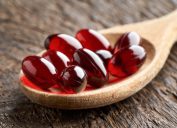New Study Warns Vitamin B3 Supplements Could Spike Heart Disease Risk
Also called niacin, this vitamin is added to several processed foods.

There are endless reasons to enhance your diet with vitamins and supplements. You might seek out options to boost collagen production, promote brain health, or even combat aging—and depending on your doctor's recommendations, there could be an ideal combination for your specific needs. However, as is so often the case, you need to be mindful of getting too much of a good thing. A new study from researchers at Cleveland Clinic found that one common supplement and food additive, vitamin B3 (or niacin), can actually spike your heart disease risk.
RELATED: 12 Supplements You Should Never Take Together, Medical Experts Say.
The study was published electronically in Nature Medicine on Feb. 19, and links excess levels of vitamin B3 to increased cardiovascular disease risk. The vitamin occurs naturally in poultry, fish, bananas, and nuts, among other foods, but is also added to flour, cereals, breads, and other processed foods to avoid vitamin B3 deficiency. According to a press release outlining findings, this has been a practice since World War II.
Now, however, we rely too much on processed food—and people are getting more niacin than they need. This is further complicated by the popularity of dietary supplements that have niacin and advertise unsupported anti-aging effects, Stanley Hazen, PhD, MD, chair of Cardiovascular and Metabolic Sciences in Cleveland Clinic's Lerner Research Institute, said in the press release.
Too much of the vitamin leads to the formation of a blood metabolite called 4PY, which can then trigger inflammation and damage blood vessels, Hazen told CBS News. Researchers identified this by analyzing plasma from 1,162 patients with stable cardiac disease, looking for molecules that could predict major adverse cardiovascular events (MACE) without looking at other risk factors.
"What's exciting is that this pathway appears to be a previously unrecognized yet significant contributor to the development of cardiovascular disease," Hazen, who is also co-section head of Preventive Cardiology in Cleveland Clinic's Heart, Vascular & Thoracic Institute, said in a press release. "What's more, we can measure it, meaning there is potential for diagnostic testing. These insights set the stage for developing new approaches to counteract the effects of this pathway."
RELATED: 7 Surprising Benefits of Taking Magnesium Every Day.
Researchers are hopeful that the study could effect change in nutritional policy–and instill a cautionary approach to niacin supplements.
"For decades, the United States and more than 50 other nations have mandated niacin fortification in staple foods such as flour, cereals and oats to prevent pellagra and other niacin deficiency syndromes," Hazen said in the press release. (Pellagra can cause symptoms throughout the entire body and also damage the nervous system or lead to death if left untreated.)
While the policy helped prevent nutritional deficiencies over the past several decades and drastically reduced pellagra deaths, Hazen noted that fortification of flour and cereal could have simultaneously contributed to the rise in cardiovascular disease over the past 75 years.
"The takeaway is not that we should cut out our entire intake of niacin—that's not a realistic or a healthy approach," Hazen said, also stressing the need to talk to your healthcare provider about any vitamin B3 supplementation.
"Patients should consult with their doctors before taking over-the-counter supplements and focus on a diet rich in fruit and vegetables while avoiding excess carbohydrates," he concluded.
Best Life offers the most up-to-date information from top experts, new research, and health agencies, but our content is not meant to be a substitute for professional guidance. When it comes to the medication you're taking or any other health questions you have, always consult your healthcare provider directly.




















